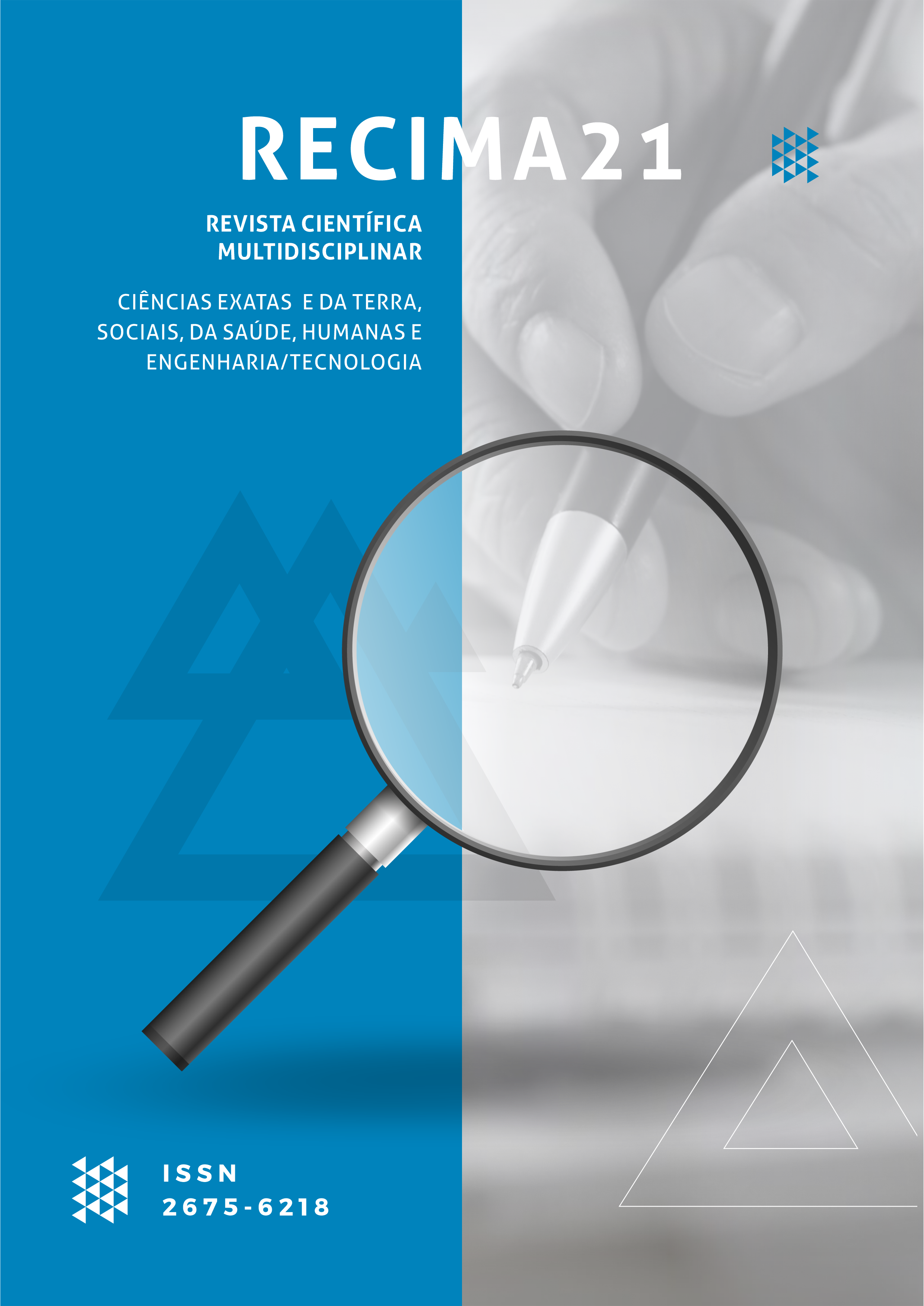HUMANIZATION OF NURSING ASSISTANCE FOR INSTITUTIONALIZED ELDERLY
DOI:
https://doi.org/10.47820/recima21.v3i12.2431Keywords:
Institutionalized Elderly, Quality of life, Nursing careAbstract
Humanization in health aimed at institutionalized elderly people can not only meet any type of patient's need in their particular institution, but also come to see them as a complete human being who needs care to achieve a satisfactory recovery and quality of life. in addition to understanding the different approaches involved in the dynamics of clients' lives, recognizing their rights, their history and their feelings, since the word “humanization” is conceived as a type of meeting the integral needs of the individual and basic human needs. The objective was to identify publications on the humanized comprehensive care of nursing care for institutionalized elderly in the national and international literature, aiming at improving the quality of life in long-stay institutions. This is an integrative literature review, carried out between September and October 2022. Data collection was carried out by searching scientific articles published in the last 10 years in the Virtual Health Library (BVS-BIREME) using the descriptors “Institutionalized elderly”, “Quality of life” and “Nursing care”. Six studies related to the theme were selected, categorized into two categories, namely: studies focusing on humanized nursing care; and studies focusing on nursing care in the prevention of falls and quality of life. We emphasize the need for nursing care with a focus on humanization so that the elderly residents of these institutions can have health and quality of life worthy of any elderly person in the community.
Downloads
References
AMERICAN PSYCHOLOGICAL ASSOCIATION. Manual of the American Psychological Association, 6ª ed. (2009).
ASSIS, L. D.; CHAGAS, O. V.; VALENTE, M.; GORZONI, L. M. Polypharmacy and the use of inappropriate medications in institutionalized elderly: lessons still not learned. Programa de Pós-graduação em Ciências da Saúde, Universidade Federal de Goiás (UFG) – Goiânia (GO), Brasil. Disponível em: https://pdfs.semanticscholar.org/23ec/ed4a16800a95f587e8771f17941544b70a68.pdf.>. Acessado em: 21 de jul. de 2022.
BERK, L. Development Through the Lifespan, Allyn & Bacon, 2010, p. 607.
BRASIL. Ministério da Saúde. Estatuto do idoso. Brasília: Ministério da Saúde, 2010. Disponível em: <https://bvsms.saude.gov.br/bvs/publicacoes/estatuto_idoso_3edicao.pdf.>. Acessado em: 17 de jun. 2022.
BUTLER, N. (1969). Age-Ism: Another Form of Bigotry . The Gerontologist (Part_1): 243-246.
CARREIRA, L. et al. Prevalência de depressão em idosos institucionalizados. Departamento de Enfermagem da Universidade Estadual de Maringá. Maringá, Paraná, Brasil. Disponível em:<
http://www.revenf.bvs.br/pdf/reuerj/v19n2/v19n2a16.pdf.>. Acessado em: 22 de jul. de 2022.
IBGE. Instituto Brasileiro de Geografia e Estatística. Projeções e estimativas da população do Brasil e das Unidades da Federação; Projeção da população. Disponível em: . Acessado em: 08 de set. de 2022.
FERREIRA. O. D. C; YOSHITOME, A. Prevalência e caraterísticas das quedas de idosos institucionalizados. Universidade Federal de São Paulo. Departamento de Enfermagem. Revista Brasileira de Enfermagem (REBEn). Disponível em: < https://www.scielo.br/j/reben/a/NCGDpRBn5TC9hnncfgwCRbr/?format=pdf&lang=pt>. Acessado em: 20 de jul. de 2022.
FORMAN, D. E.; BERMAN, A. D.; CABE, C. H.; BAIM, D. S.; WEI, J. Y. (1992). PTCA in the elderly: The "young-old" versus the "old-old. J. of the American Geriatrics Society 40 (1): 19-22.
OLIVEIRA, A. S.; et al., Saúde, envelhecimento e representações sociais. 1ª ed. João Pessoa: Editora da UFPB, 2013. Disponível em: <https://www.scielo.br/j/pcp/a/sh5JwvpkBrn5Grfmrzqkfpf/.>. Acessado em: 17 de jun. 2022.
SILVA, L. R. F. Da velhice a terceira idade: O percurso histórico das identidades atreladas ao processo de envelhecimento. Rio de Janeiro: Hist. Cienc. SaúdeManguinhos. 2008; 15 (1): 155-168. Disponível em: <https://www.academicoo.com/artigo/da-velhice-a-terceira-idade-o-percurso-historico-das-identidades-atreladas-ao-processo-de-envelhecimento.>. Acessado em: 17 de jun. 2022.
SILVA, A. A.; BORGES, M. M. M. C. Humanização da Assistência de Enfermagem ao idoso em uma Unidade de Saúde da Família. Revista Enfermagem Integrada. 2014; 1(1): 11-24.
Ministério da Saúde. Envelhecimento e Saúde da Pessoa Idosa. 2007; Série A; Normas e Manuais Técnicos; Caderno de Atenção Básica n° 19. 1° ed. Brasília.
MEDEIROS, F. A. L, et al., O cuidar de pessoas idosas institucionalizadas na percepção da equipe de enfermagem. Revista Gaúcha de Enfermagem. 2015; 36(1):56-61.
RAMOS, L. R.; VERAS, R. P.; KALACHE, A. Envelhecimento populacional: uma realidade brasileira. São Paulo: Revista Saúde Pública. 2008; 21(3): 211-24. Disponível em: <https://repositorio.unifesp.br/handle/11600/218)>. Acessado em: 06 de jul. 2022.
SILVA, R. M. et al. A percepção do idoso institucionalizado sobre os benefícios das oficinas terapêuticas. Faculdade de ciências Médicas de Minas Gerais – FCMMG – Belo Horizonte (MG) – Brasil. Disponível em: <https://ojs.unifor.br/RBPS/article/view/6408/5215.>. Acessado em: 26 de jul. de 2022.
SOUZA, E. M.; MELO, A. L.; CARRARA, G. Percepções dos idosos institucionalizados sobre os cuidados de enfermagem. Centro Universitário UNIFAFIBE de Bebedouro, SP. Disponível em: <http://repositorio.unifafibe.com.br:8080/xmlui/bitstream/handle/123456789/596/2020_MEDS.pdf?sequence=1&isAllowed=y.>. Acessado em: 20 de jul. de 2022.
VAN SANTEN, H. (2016). «Peer review post-mortem: how a flawed aging study was published in Nature». NRC. Consultado em 10 de setembro de 2022.
Downloads
Published
Issue
Section
Categories
License
Copyright (c) 2022 RECIMA21 - Revista Científica Multidisciplinar - ISSN 2675-6218

This work is licensed under a Creative Commons Attribution 4.0 International License.
Os direitos autorais dos artigos/resenhas/TCCs publicados pertecem à revista RECIMA21, e seguem o padrão Creative Commons (CC BY 4.0), permitindo a cópia ou reprodução, desde que cite a fonte e respeite os direitos dos autores e contenham menção aos mesmos nos créditos. Toda e qualquer obra publicada na revista, seu conteúdo é de responsabilidade dos autores, cabendo a RECIMA21 apenas ser o veículo de divulgação, seguindo os padrões nacionais e internacionais de publicação.













